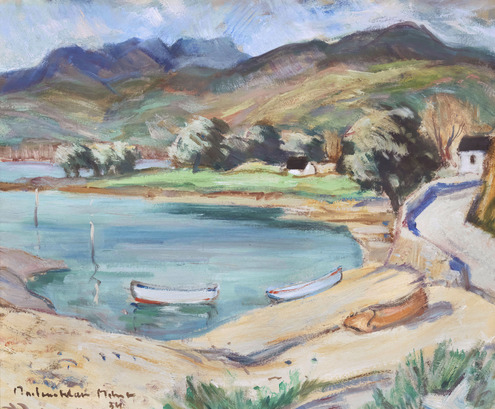John MacLauchlan Milne R.S.A. (1885-1957)
Low Tide, Sannox Bay
John MacLauchlan Milne was born in Edinburgh in 1885, the son of the Scottish landscape painter Joseph Milne. He studied at the Edinburgh College of Art, later moving to Kingoodie near Dundee until the outbreak of the First World War. After serving in the Royal Flying Corps he returned briefly to Dundee before going to Paris where he painted a series of street scenes.
Between 1919 and 1932 Milne spent a substantial part of the year in France. He worked in the South of France with his French wife at Lavardin and benefited from a stipend paid by the Dundee marmalade manufacturers Keillers, who took up a proportion of his work. Milne often stayed at Cassis at the same time as F.C.B. Cadell, S. J. Peploe and Duncan Grant. He also spent considerable time in St. Tropez, still in those days an unspoilt port. Almost all of his exhibits of the 1920s were landscapes of the Mediterranean.
At the outbreak of the Second World War Milne returned to Scotland and settled in the hamlet of High Corrie on the isle of Arran where he remained until his death in 1957. The landscapes of the West Highlands and in particular, High Corrie, constitute the bulk of the work of his maturity.Milne painted in a light and broad manner reflecting the influence of the Colourists and van Gogh, especially in his flower paintings. Milne was elected ARSA in 1934 and RSA in 1938. From 1912 to 1954 he exhibited annually at the Royal Scottish Academy, except during the First World War years. His work was also exhibited at the Glasgow Institute and in London (Reid and Lefevre, 1929) and in New York (N.Y.World Fair, 1939).
Oil on board
Signed and dated
15 x 18 ins (38 x 45.7 cms)
1934
Provenance
Private collection, UK
